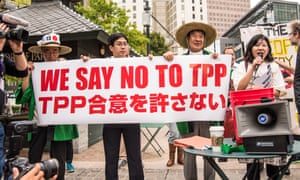http://www.theguardian.com/business/2016/jan/10/in-2016-better-trade-agreements-trans-pacific-partnership
In 2016, let's hope for better trade agreements - and the death of TPP
Last year was a memorable one for the global economy. Not only was overall performance disappointing, but profound changes – both for better and for worse – occurred in the global economic system.
Most notable was the Paris climate agreement reached last month. By itself, the agreement is far from enough to limit the increase in global warming to the target of 2ºC above the pre-industrial level. But it did put everyone on notice: the world is moving, inexorably, toward a green economy. One day not too far off, fossil fuels will be largely a thing of the past. So anyone who invests in coal now does so at his or her peril. With more green investments coming to the fore, those financing them will, we should hope, counterbalance powerful lobbying by the coal industry, which is willing to put the world at risk to advance its shortsighted interests.
Indeed, the move away from a high-carbon economy, where coal, gas, and oil interests often dominate, is just one of several major changes in the global geo-economic order. Many others are inevitable, given China’s soaring share of global output and demand. The New Development Bank, established by the Brics (Brazil, Russia, India, China, and South Africa), was launched during the year, becoming the first major international financial institution led by emerging countries. And, despite Barack Obama’s resistance, the China-led Asian Infrastructure Investment Bank was established as well, and is to start operation this month.
The US did act with greater wisdom where China’s currency was concerned. It did not obstruct the renminbi’s admission to the basket of currencies that constitute the International Monetary Fund’s reserve asset, Special Drawing Rights (SDRs). In addition, a half-decade after the Obama administration agreed to modest changes in the voting rights of China and other emerging markets at the IMF – a small nod to the new economic realities – the US Congress finally approved the reforms.
The most controversial geo-economic decisions last year concerned trade. Almost unnoticed after years of desultory talks, the World Trade Organization’s Doha Development Round – initiated to redress imbalances in previous trade agreements that favored developed countries – was given a quiet burial. America’s hypocrisy – advocating free trade but refusing to abandon subsidies on cotton and other agricultural commodities – had posed an insurmountable obstacle to the Doha negotiations. In place of global trade talks, the US and Europe have mounted a divide-and-conquer strategy, based on overlapping trade blocs and agreements.
As a result, what was intended to be a global free trade regime has given way to a discordant managed trade regime. Trade for much of the Pacific and Atlantic regions will be governed by agreements, thousands of pages in length and replete with complex rules of origin that contradict basic principles of efficiency and the free flow of goods.
The US concluded secret negotiations on what may turn out to be the worst trade agreement in decades, the so-called Trans-Pacific Partnership (TPP), and now faces an uphill battle for ratification, as all the leading Democratic presidential candidates and many of the Republicans have weighed in against it. The problem is not so much with the agreement’s trade provisions, but with the “investment” chapter, which severely constrains environmental, health, and safety regulation, and even financial regulations with significant macroeconomic impacts.
In particular, the chapter gives foreign investors the right to sue governments in private international tribunals when they believe government regulations contravene the TPP’s terms (inscribed on more than 6,000 pages). In the past, such tribunals have interpreted the requirement that foreign investors receive “fair and equitable treatment” as grounds for striking down new government regulations – even if they are non-discriminatory and are adopted simply to protect citizens from newly discovered egregious harms.
While the language is complex – inviting costly lawsuits pitting powerful corporations against poorly financed governments – even regulations protecting the planet from greenhouse gas emissions are vulnerable. The only regulations that appear safe are those involving cigarettes (lawsuits filed against Uruguay and Australia for requiring modest labeling about health hazards had drawn too much negative attention). But there remain a host of questions about the possibility of lawsuits in myriad other areas.
Furthermore, a “most favoured nation” provision ensures that corporations can claim the best treatment offered in any of a host country’s treaties. That sets up a race to the bottom – exactly the opposite of what US President Barack Obama promised.
Even the way Obama argued for the new trade agreement showed how out of touch with the emerging global economy his administration is. He repeatedly said that the TPP would determine who – America or China – would write the twenty-first century’s trade rules. The correct approach is to arrive at such rules collectively, with all voices heard, and in a transparent way. Obama has sought to perpetuate business as usual, whereby the rules governing global trade and investment are written by US corporations for US corporations. This should be unacceptable to anyone committed to democratic principles.
Those seeking closer economic integration have a special responsibility to be strong advocates of global governance reforms: if authority over domestic policies is ceded to supranational bodies, then the drafting, implementation, and enforcement of the rules and regulations has to be particularly sensitive to democratic concerns. Unfortunately, that was not always the case in 2015.
In 2016, we should hope for the TPP’s defeat and the beginning of a new era of trade agreements that don’t reward the powerful and punish the weak. The Paris climate agreement may be a harbinger of the spirit and mindset needed to sustain genuine global cooperation.
約瑟夫·施蒂格利茨:2016年期待TPP死亡
2016年01月14日10:14
參考消息網1月14日報導英國《衛報》網站1月11日發表題為《2016年,讓我們期望更好的貿易協定誕生,TPP死亡》的文章,作者是諾貝爾經濟學獎得主約瑟夫·施蒂格利茨。文章稱,對全球經濟而言,2015年令人難忘。全球經濟體系整體表現令人失望,同時還出現了或好或壞的重大變化。
世界正在向綠色經濟發展
最值得注意的是上月通過的巴黎氣候協定。儘管協定本身遠不足以將全球氣候變暖程度限制在比前工業化水平高2攝氏度的範圍,但它讓人們意識到:世界正在向綠色經濟發展,這一趨勢不可逆轉。在不遠的將來,多數化石燃料都將成為過去。所以,現在還投資煤炭的人要自擔風險。我們希望,隨著綠色投資的湧現,投資者將奮起反抗煤炭業強大的遊說力量。為了眼前的利益,煤炭業甘願讓全球承擔風險。
的確,讓煤炭、天然氣和石油行業利益主導的高碳經濟轉型,只是全球地緣經濟秩序的重大變化之一。
中國改變著地緣經濟秩序
鑑於中國占全球產出和需求的比例日益增加,還有許多重大變化不可避免。去年,由金磚國家(巴西、俄羅斯、印度、中國和南非)成立的新開發銀行成為第一家由新興國家領導的國際金融機構。
儘管貝拉克·奧巴馬予以阻撓,但由中國領導的亞洲基礎設施投資銀行仍得以成立,並將於本月開始運行。
在人民幣問題上,美國的做法體現了更大的智慧。首先,美國並未阻止人民幣被納入國際貨幣基金組織特別提款權(SDR)貨幣籃子。其次,在奧巴馬政府同意適度調整中國等新興市場在國際貨幣基金組織投票權(這在一定程度上承認了新的經濟現實)的五年後,美國國會終於批准了這項改革。
全球貿易體係並不和諧
去年最具爭議的地緣經濟決策與貿易有關。經過幾年缺乏條理的談判後,在幾乎未受任何關注的情況下,世界貿易組織多哈回合談判被默默地埋葬。多哈回合談判的宗旨是修改以往貿易協定中對發達國家有利的條款以求平衡。美國的虛偽——倡導自由貿易,卻拒絕放棄對棉花等大宗農產品的補貼政策——為多哈談判設置了難以逾越的障礙。為取代全球貿易談判,美國和歐洲根據相互重疊的貿易同盟和貿易協定,採取了分而治之的戰略。
結果,人們期待建立的全球自由貿易體系讓位於一種並不和諧的貿易體系。太平洋和大西洋地區的多數貿易都要受制於繁冗的協議,這些長達數千頁的協議充滿複雜的原產地規則,而這些規則卻與效率和商品自由流通等基本原則背道而馳。
幾十年來最糟糕貿易協定
美國為《跨太平洋夥伴關係協定》(TPP)舉行的秘密談判已經結束。也許,該協定最終會被證明是幾十年來最糟糕的貿易協定。而現在,為獲得正式批准,該協定還面臨一場惡戰,因為所有支持率領先的民主黨總統候選人和多名共和黨總統候選人都表示反對批准該協定。TPP的主要問題不是貿易條款,而是有關“投資”的章節嚴重限制了環境、健康和安全監管,甚至是具有重大宏觀經濟影響的金融監管。
特別是,該章節規定,當外國投資者認為政府監管違背TPP條款時,則有權向國際仲裁法庭提起訴訟。過去,這些國際仲裁法庭會將外國投資者對“公平待遇”的訴求作為阻止新的政府監管的理由,即使這些監管並不存在歧視,而只是為了保護本國公民不受新發現的異常侵害。
TPP的條款複雜,使實力雄厚的大企業能夠向財政緊張的政府提起代價高昂的訴訟,在這種情況下,即使是保護地球不受溫室氣體排放侵害的監管也脆弱不堪。唯一看似安全的監管就是與香煙有關的監管。但至於眾多其他領域會不會出現這種訴訟,仍有許多疑問。
此外,“最惠國”條款確保了企業可以要求享受東道國任何貿易條約所提供的最惠待遇。而由此形成的“逐底競爭”卻與奧巴馬的承諾截然相反。
美罔顧全球經濟發展現實
就連奧巴馬為TPP辯護的方式都體現出,美國政府多麼脫離全球經濟發展的現實。奧巴馬多次表示,TPP將決定由誰(美國或中國)來書寫21世紀的貿易規則。而製定這些貿易規則的正確方式應該是,公開透明、集思廣益。通過讓美國企業為美國企業製定全球貿易和投資規則,奧巴馬尋求永遠維持現狀。對任何遵循民主原則的人而言,這都是不可接受的。
那些尋求加深經濟一體化的人肩負一項特殊的使命,即堅定支持全球治理改革:如果將涉及國內政策的權力讓渡給跨國機構,那麼規則和監管制度的起草、實施和執行則必須對涉及民主的擔憂尤其敏感。遺憾的是,在2015年,情況並非總是如此。
2016年,我們應該期望TPP擱淺,一個不會賞強罰弱的貿易規則新時代由此開啟。巴黎氣候協定也許是維繫真正的全球合作所需精神和心態的先導。



沒有留言:
張貼留言